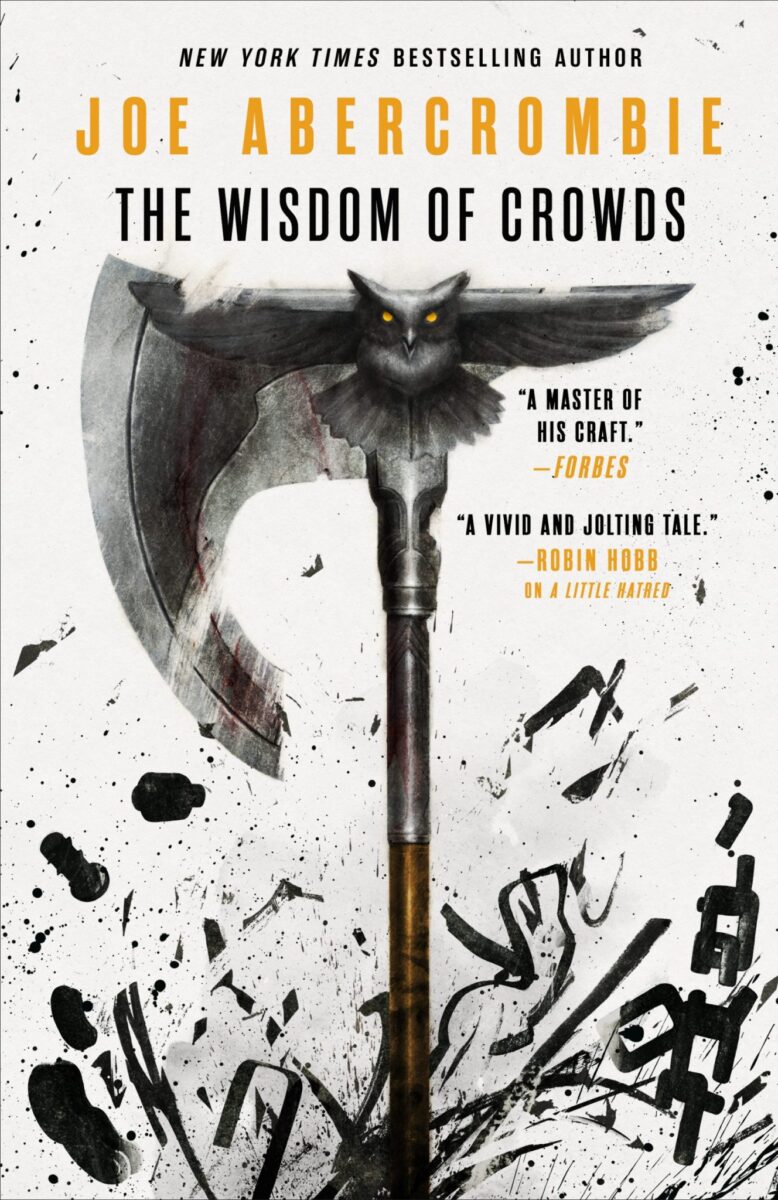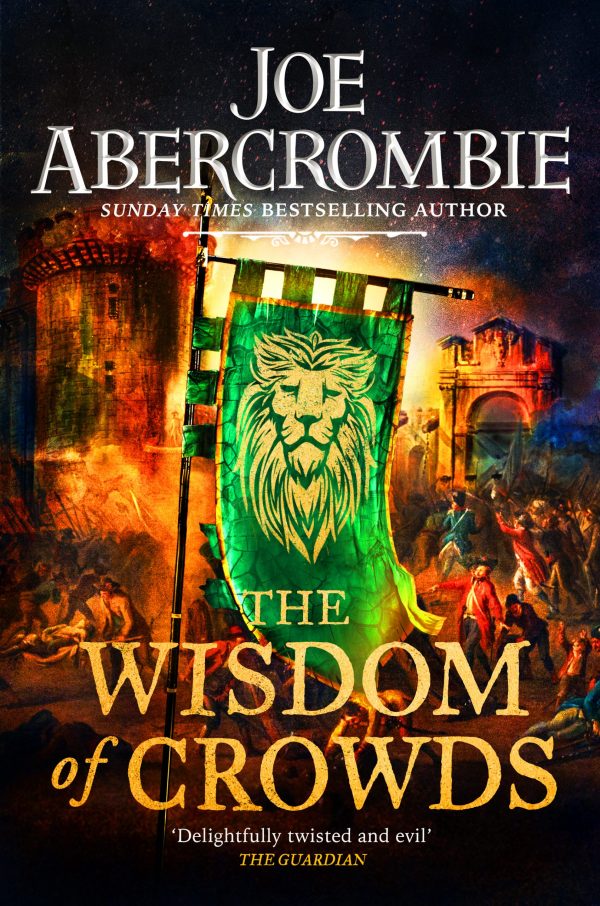As a longtime Joe Abercrombie reader, I had high expectations for the follow-up to his original trilogy and the series that would come after the last novel, the stand-alone Red Country. To take a world as grim as The First Law trilogy and bring it into the industrial age was a bold move but one that The Wisdom of Crowds ultimately proves to be the right choice for not only the world-building but the overall story. The Age of Madness is not a series of good triumphing over evil but of power and what humanity does with that power. There are characters you root for and ones you root for the worst to happen to. You hope for both the ones that treat people right and treat people wrong to get what they deserve, but almost no characters in an Abercrombie novel leave without some blood on their hands.
Recently, I published my predictions for how The Age of Madness would end. Without saying which ones were wrong or right, I’ll state where my predictions were way off was the tone. Though A Little Hated and The Trouble with Peace had the violence mixed with humor that defines Abercrombie’s writing style, the tone always seemed hopeful. The tragedy of the original trilogy is that characters like Jezal dan Luthar, Logen Ninefingers, and Ferro Maljinn desperately want to change for the better only for the world and those in power keep them from it. The Trouble with Peace‘s ending left me hopeful for the future for nearly all of the point-of-view characters to have the opportunity for change the originals did not. I completely neglected to recall who Joe Abercrombie is as a writer. This book may be the grimmest and darkest of his books since Best Served Cold, but none of it becomes so over the top that it transforms into a parody of itself. The plot is an in-depth look into people’s choices and the thin line between justice and revenge. It puts the reader in a position of not knowing who to root for in a way that draws them in rather than pushing them away. It asks how far people will go to change the system built to keep them down and where to draw the line, so the cycle does not continue.

In good times, the bittersweet nature of Abercrombie’s writing is easier to digest. In more challenging times, the cynicism of it all can be brutal. During The Great Change, there are no heroes, only some heroic acts with ulterior motives. Abercrombie can turn something that seems so white hat as the mistreated labor workers seizing the government to secure better worker rights and turn it into the ugliest side of humanity, choosing revenge over justice. So often, the brutality of the author’s world has the humor to balance it out, acting as a chaser to the harsh realities. Perhaps The Wisdom of Crowds seems harsher than others because The Great Change’s chaotic violence leaves little room for humor. Yet, once I started reading it, I could not stop. All five hundred and eleven pages read in one sitting, so few books I can say that about especially as long as these.
The way I read the second book’s ending, The Great Change, the revolution the Breakers and the Burners have talked about since their introduction in the first book, seemed like an Act II event for the final one. However, in one fell swoop, with Abercrombie’s signature style events transitioning from one background character point-of-view to another within a single chapter, the Breakers and Burners have seized power from the Closed Council and the King of the Union, Orso dan Luthar. It establishes a heightened tension in the Union straight away, and that feeling doesn’t come down until the book’s climax. Rikke and Clover’s chapters set in the North, a setting often full of bloodshed and violence compared to the Union, served as a time to exhale.

Abercrombie is a devious writer, turning the son of Jezal dan Luthar, a self-absorbed, arrogant, and pompous noble in the original trilogy, and made that incredibly likable in Orso by simply mixing in self-awareness and self-deprecation. Then in the second book, he turns him into one of the best characters by making him a king who is aware of his limited power, takes responsibility anyway, and uses the perception of his incompetence to get one over on his enemies. In addition, he is one of the few monarchs for the Union who knows the truth about Bayaz being the real power behind the government. It’s a tragic irony that the one king who is aware of everything wrong with the Union and is in a position to try and change it is the one that is deposed. After winning his battle against the Open Council rebellion with his competency, everything is taken away when the disenfranchised industrial workers seize the head of government. Orso is by far the most prominent example, but The Wisdom of Crowds has many interesting parallels to The Last Argument of Kings more than the previous books in this series had with the original trilogy.
Though the book has no heroes, it certainly has villains. The first, Judge, is the insane and violent leader of the Burners who will destroy everything and execute everyone in the cruelest way she can think of in her insane vision of remaking the nation through destruction. The other is Leo dan Brock who takes his loss at the end of the last book, and instead of self-reflecting on his foolishness and become a better person, he is determined to take any action required never to lose as severely ever again. Any sympathy or empathy I had for Leo at the end of the previous book. Brock learns all the worst traits from his wife, Savine, turning him into a reflection of her adopted father, Sand dan Glokta, with far too much hubris to make him nearly as likable.
If his wife, the former Savine dan Glokta, is intended to be taken as much of a villain as her husband by the novel’s end, I did not feel it. Though ultimately motivated by pure self-preservation of her and her newly born children, Savine mostly goes through a babyface turn as she changes for the better. She uses her skills as a master manipulator and deal maker to make her look charitable in the people’s eyes, including the Breakers and the Burners. She may be doing it to keep herself safe, but she still genuinely helps the people of the Union in disarray by The Great Change. By the end, it doesn’t necessarily mean Savine is the best person but she is far easier to cheer for than her husband.
Rikke has remained the easiest character to root for throughout the series. That continues in The Wisdom of Crowds, but the twists in her book chapters were clear from the beginning. Predictability doesn’t necessarily mean it is unsatisfying. If it’s the ending the audience wants, then the lead-up to the climax of her story in the North builds up more and more anticipation. I’ll be interested in finding out if the direction her chapters went were as clear from the beginning to others as it was for me, or is it due to how familiar I am with Abercrombie’s storytelling. Isern-i-Phail has constantly reiterated how Rikke needs to make her heart a stone if she wants to survive. In this book, more than any other, she achieves this. It’s interesting to put Savine side-by-side with Rikke in this book as if when Savine let her heart become less of a stone, Rikke hardened her own heart to balance it out.
The final book in The Age of Madness not only gives a satisfying yet bittersweet conclusion to the series but leaves Joe Abercrombie’s Circle of the World in a place far different from where the original trilogy left it. It doesn’t necessarily have a happy ending, but I felt utter happiness after reading it. If this is the finale for this world, it’ll remain one of my favorite fantasy series of all time. If Joe Abercrombie plans to continue telling stories in this setting, he has laid the groundwork for many potential new directions for it to go. Whatever Joe Abercrombie does next, I’ll be waiting with anticipation, but for now, I’ll be taking my copy of The Blade Itself off the shelf and start all ten books over again.
See my review for the first book, A Little Hatred.
See my review for the second book, The Trouble with Peace.
Joshua was provided an advance copy of the book by Orbit books.
If you liked this review, please consider buying the reviewer a coffee.
Follow Joshua MacDougall @FourofFiveWits on Twitter.
